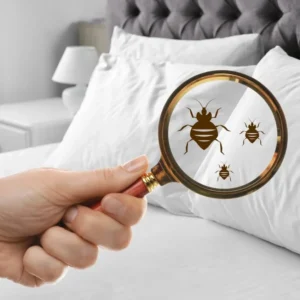
Bed bugs are prominent for their capability to invade homes and businesses undetected, often becoming a significant problem before they’re noticed. Early detection is fundamental in preventing these pests from establishing a large-scale infestation. Recognizing the signs of bed bugs in their initial stages can save time, money, and stress. Bed Bugs Arizona, a professional bed bug company, offers expert insights into identifying these elusive pests before they become a significant issue.
Understanding Bed Bug Behavior
Understanding bed bug behavior and habits is essential to spot bed bug infestations early. Bed bugs are nocturnal critters that feed on human blood. They typically hide in tiny cracks and crevices near their food source during the day, emerging at night to feed. These pests are excellent hitchhikers, often entering homes on luggage, clothing, or used furniture. Their ability to hide in tiny spaces makes them challenging to detect, but knowing their preferred habitats can aid in early identification.
Visual Signs of Bed Bugs
One of the most reliable ways to detect bed bugs early is through visual inspection. Adult bed bugs are approximately the diameter of an apple seed, oval-shaped and reddish-brown. Nymphs (younger bed bugs) are smaller and lighter in color, often appearing translucent or whitish-yellow. When conducting a visual inspection, focus on areas such as mattress seams and tags, box spring edges and corners, headboards and bed frames, cracks in wooden furniture, behind loose wallpaper or peeling paint, and electrical outlets and switch plates. Look for live bugs, shed skins, and tiny white eggs. These visual clues are often the first indicators of a budding infestation.
Telltale Stains and Marks
Bed bugs leave behind various stains and marks that can signal their presence. Dark or rusty spots on mattresses, sheets, or walls are often bed bug excrement. These spots may bleed into the fabric like a marker would. Small blood stains on sheets or pillowcases can indicate that bed bugs have been feeding. Additionally, a sweet, musty odor may be present in heavily infested areas, typically only noticeable in severe cases.
Physical Symptoms
While not everyone has a physical reaction to bed bug bites, those who do may have small, red, itchy welts on their skin. These bites often appear in a line or cluster and are commonly found on exposed body areas during sleep, such as the arms, legs, and neck. However, it’s vital to note that bed bug bites can be easily misunderstood with other insect bites or skin conditions, so they should not be the sole basis for determining an infestation.
Proactive Monitoring
Implementing proactive monitoring strategies can help catch bed bug infestations in their early stages. Bed bug interceptors, small devices placed under the legs of beds and furniture, can capture bed bugs as they climb up or down, providing early warning of their presence. Light-colored sheets can make it easier to spot bed bugs or their droppings. Regular inspections of these monitoring tools and bedding can lead to early detection.
Travel Precautions
Many bed bug infestations begin with travel. When staying in hotels or similar accommodations, it is advisable to conduct a brief inspection of the room upon arrival. Checking the mattress, headboard, and furniture for signs of bed bugs can prevent these pests from being brought home. Keeping luggage elevated and away from the bed, preferably on luggage racks, reduces the risk of picking up bed bugs. Upon returning home, inspecting and vacuuming suitcases before bringing them inside and washing and drying clothes on high heat can kill potential stowaways.
Professional Inspection
While personal vigilance is crucial, professional inspections can provide an extra layer of security in detecting bed bugs early. Pest control experts from companies like Bed Bugs Arizona have the training and tools to spot subtle signs of bed bugs that untrained eyes might miss. They can inspect homes or businesses thoroughly, identify potential hiding spots, and use specialized equipment to detect bed bugs in hard-to-reach areas.
Educating Household Members
Early detection of bed bugs is a team effort. Educating all household members or employees about the signs of bed bugs increases the chances of spotting an infestation in its early stages. Encouraging everyone to report suspicious signs immediately and creating an open dialogue about early detection can significantly improve the chances of catching an infestation before it spreads.
Responding to Suspected Infestations
If bed bugs are suspected, acting quickly is critical. Avoiding moving items from the infested area keeps the bugs from spreading to other parts of the home or business. The most effective result is to contact a professional bed bug company like Bed Bugs Arizona for a thorough inspection and treatment plan. Attempting to treat the infestation without professional help can spread the problem or become more entrenched.
Spotting bed bug infestations early requires vigilance, knowledge, and proactive measures. By understanding the characteristics of bed bugs and implementing regular inspection routines, individuals and businesses can catch these pests before they become a significant problem. Remember that bed bugs are experts at hiding, so even with diligent efforts, they can sometimes go unnoticed. When in doubt, consulting with a professional bed bug company like Bed Bugs Arizona can provide comfort and expert assistance in identifying and addressing potential infestations. Early detection and professional treatment are the most effective strategies for keeping homes and businesses bed bug-free.
Bed Bugs Arizona offers a free, in-home bed bug inspection and a one-year warranty on all bed bug services. No obligation. We specialize in apartment communities. Our fast, certified technicians provide the Bed Bug Pro-Treat Plus method of bed bug removal to Phoenix and surrounding cities in a 100-mile-plus radius, including Flagstaff, Globe, and Casa Grande. Veteran and senior discounts. Call now at (623) 451-0541.
